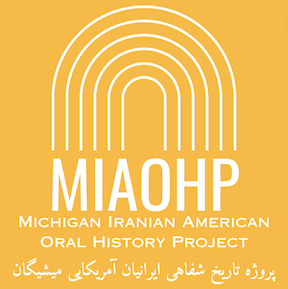MIAOHP Interviews
Item set
Title
MIAOHP Interviews
Items
-
Zoreh Raein
Zoreh Raein was interviewed by Camron Michael Amin at her home in West Bloomfield on April 13th, 2017. Her career as a librarian in Iran, Michigan, and in Qatar was part of rich of array of transnational experiences in the wake of the revolution of 1979. She also provides a window on the local Iranian American community's efforts to create and support durable cultural organization in Southeast Michigan. -
Mohammad Elahi
On July 6th 2017, Mohammad Elahi, the pastor [Imam] of the Islamic House of Wisdom mosque in Dearborn Heights Michigan was interviewed by Camron Michael Amin and Tina Nelson in his home. This far-ranging interview covers his career as a cleric before, during and after the revolution of 1979. His journey from Isfahan to Tehran to Europe and, ultimately, to Michigan provides a window on the Iranian Diaspora from a devout religous perspective. He also dicusses navigating Iranian/American, Sunni-Shia and Iranian American/Arab American cultural settings. -
Sholeh Sedigheh Karimi
Sedigheh-Sholeh Karimi, born in Tehran, Iran in 1960, immigrated to the United States with her husband in 1979. She, and her two young children, moved back to Iran in 1984 for what became 10 years, unable to return to the US due to the war in Iran. While she was gone, her husband purchased a small convenience store in Port Richey, Florida. Upon her return, as entrepreneurs, they expanded their very successful business to include a restaurant across the street from the original convenience store. Sholeh became a US citizen in 2002, and considers herself American Iranian, as she feels the US feels like home. In this interview, she discusses her memories of growing up in Tehran, how her family viewed religion, and how her multiple moves to and from Iran and the US have changed and expanded her ideas of home, cultural belonging, and the strength of a familial bond. -
Taraneh Rahmanifar
Taraneh Rahmanifar emigrated from Iran to the United States when she was seventeen. In her interview, Rahmanifar recounts the founding of Persia House of Michigan, a Persian cultural group in Southeast Michigan. She outlines her motivations for beginning the group and for structuring the group the way she did before withdrawing from the group. She also discusses other ways in which she remains connected to Iran, visits back to Iran, and her thoughts on what it means to be an Iranian in America. -
Mahmoud Moallemian
Mahmoud Maollemian was attending graduate school at Michigan State University in the late 1970s, planning to return to his career in radio at NIRT (National Iranian Radio and Television). But, the Iranian Revolution of 1978-9 interrupted his plans. His interview recounts how he forged a new life and career in Michigan, becoming an important leader of the Persia House of Michigan and regular contributor to its bilingual quarterly newsletter. -
Farideh Freedom Hosseini
In Part I of the interview with Farideh Freedom Hosseini, she discusses her schooling, how she came to the United States, how she maintains her cultural identity in Michigan, and her passion for Persian poetry. -
Sarah Hassani
Sarah Hassani is a first-generation Iranian-American, born in Kalamazoo, Michigan. In her interview, Hassani shares her love for Iran and its culture. She discusses staying connected with her Iranian heritage in the United States, her trips to Iran to visit family, and her thoughts on being an Iranian-American in the United States. -
Mohammad Amin
In Part I of the interview, Amin tells his story of coming to Michigan in 1955, working in a Detroit-area automobile plant, and attending an English language program at the University of Michigan during the summer of 1955 before he travelled to Massachusets to attend Worchester Polytechnic Institute. -
Mahin Shad Oveis
Mahin Shad Oveis, a Michigan-based Iranian American, shares stories and aspects of her life and opinions. Oveis discusses things like her drive to continue her education, aspects of life in the United States versus life in Iran, her experiences as a Persian teachers, etc.
